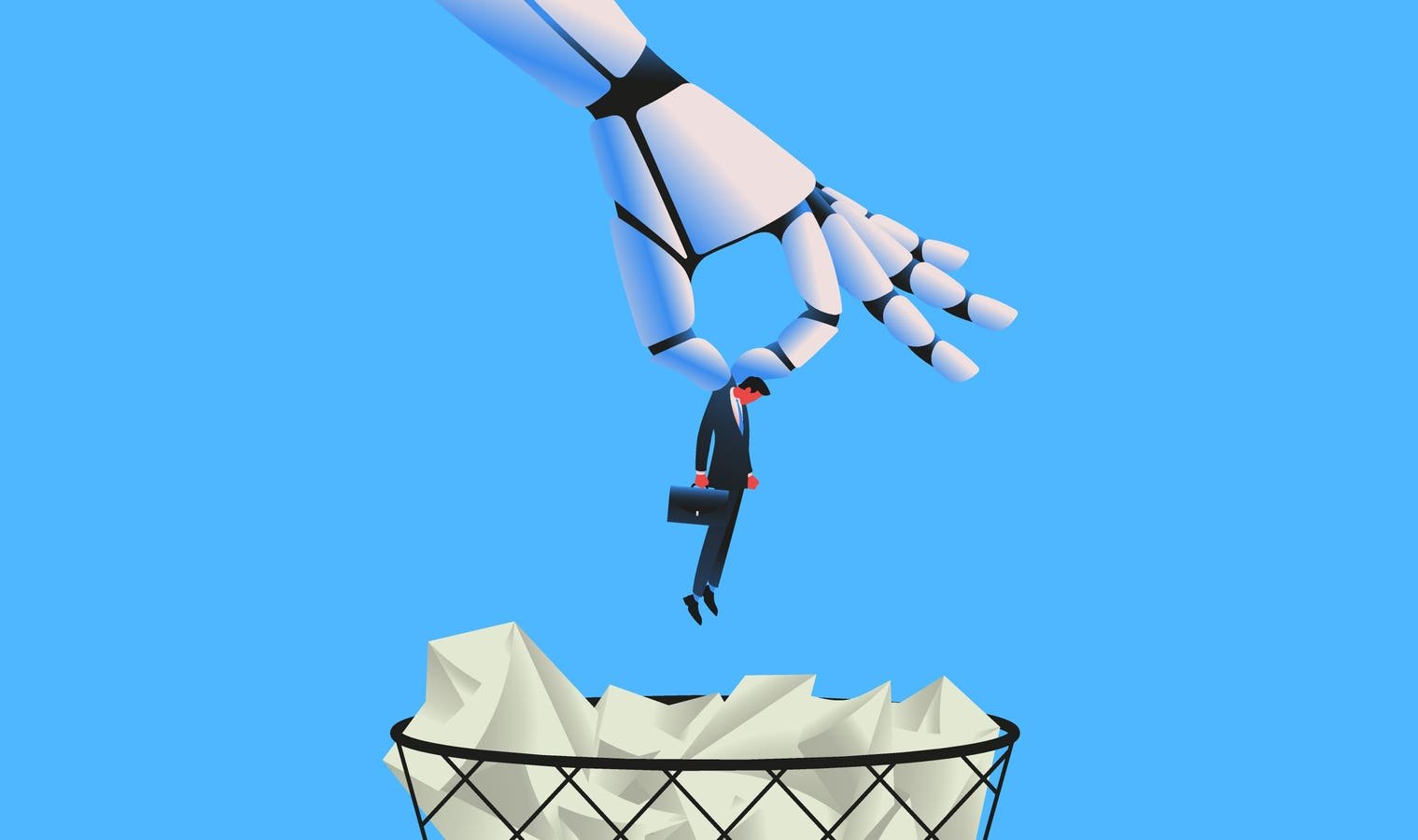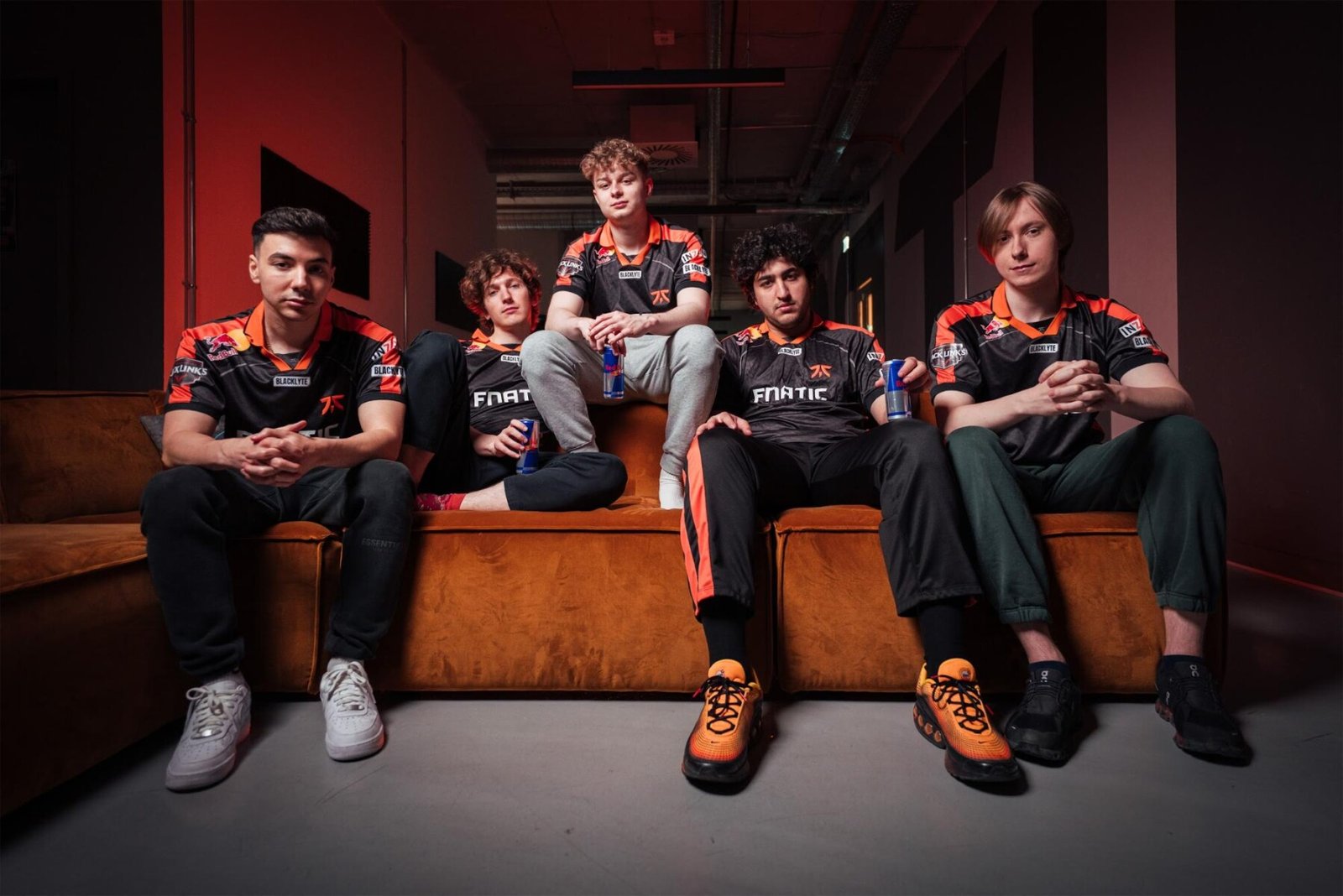Giant robot throwing man in a trash can. Artifical intelligence replacing jobs concept. Vector … More illustration.
New research from Elon University’s Imagining the Digital Future Center has surveyed nearly 200 global technology experts on the future, as humans brace for the impact of Artificial Intelligence (AI).
The result is a fantastical glimpse into a near future defined by a mixture of dystopia and utopia. What is clear is the scale of change on the horizon: 61% of experts surveyed in the study envisaged the impact of AI to be ‘deep and meaningful’ or ‘fundamental and revolutionary.’
Co-author of the report, Janna Anderson told me, “It’s a revealing and provocative declaration of the profound depth of change people are undergoing, mostly without noticing it at all, as we adapt to deeper uses of advancing digital technologies. A majority of the experts we have been surveying the past few years have also been calling on humanity to think intentionally and carefully about all of this and take wise collective action, so we don’t sleepwalk into an AI future we never intended and do not want. Many say we are running out of time. It has to be now”.
Here are five major implications for evolving leadership from the report.
Multiple Selves and Mental Health
We are no longer static selves. We have avatars, proxies, and digital twins that manage our deadlines and perhaps even our deaths. As I note in my own contribution to the report, we will come to redefine ourselves as ‘database selves’, a constellation of algorithmically-managed personas tailored to context, platform and audience. This will render the notion of authenticity obsolete.
The increasingly mediated future we are heading towards contains the potential for context collapse, and identity collapse too. Until now, most experts have warned about digital deepfakes, but it is beginning to dawn on many that in an age of AI we will face an internal rather than an external crisis.
Perhaps that is why 45% of experts surveyed think this kind of AI co-evolution will have a more negative than positive effect on mental well-being by 2035.
Barry Chudakov, of Sertain Research, imagines a future in which schizophrenia becomes the natural state of most humans, with part of us online, and part of us using AI to help self-promote, self-brand and self-improve.
Strategist, Neil Richardson, suggests that our digital shadows, the sum total of our online expressions and biometric traces, may soon outlive us, creating some kind of posthumous identity that transcends mortality.
Whilst Silicon Valley based technology forecaster Paul Saffo suggests that an AI-generated actor will win Best Supporting Actor in the 2035 Academy Awards.
A Crisis of Moral Autonomy
Evelyne Tauchnitz, a senior research fellow at the Lucerne Graduate School of Ethics, explores the implications of this shift for human freedom and personal agency. Her concern is clear: AI recommendations, manipulations and algorithmic systems designed to nudge us to what is considered ‘normal’ will create additional pressure to conform and render our ability to choose differently, and freely, much compromised. As AI continues to optimize every choice we make from what we eat to whom we trust, she ponders whether it will even be possible to contradict oneself in the future, adding:
‘Freedom is the very bedrock of moral capability. If AI directs our actions shaping our behavior based on data-driven predictions of what is ‘best’ , we lose our moral agency.’ It’s a haunting thought: in our pursuit of perfection, we may abolish the very imperfections that make us human, imperfections that, in this century, leaders have been encouraging us to embrace.
Indeed 44% of the respondents surveyed think that AI’s effect on individual agency and ability to act independently is likely to be more negative than positive with only 16% predicting a fairly equal split between positive and negative change.
Synthetic Companions, Parasocial Lives
AI won’t just inhabit our minds. Increasingly, it will replace our relationships.
Nell Watson, president of EURAIO, the European Responsible Artificial Intelligence Office, suggests that “AI romantic partners will provide idealized relationships that make human partnerships seems unnecessarily difficult’. Along the same theme, Henning Schulzrinne, former co-chair of the Internet Technical Committee of the IEEE, reflects that we will treat bots as ‘training wheels or the equivalent of treadmills at the gym’ for improving our social interactions. Overall the report paints a future where the most intimate corners of our lives are increasingly shaped by code.
In this parasocial future, emotional attachments become programmable. We form bonds with digital personas that neither disappoint nor require compromise. The relationship is one-way, the affection is frictionless. After all, why struggle to understand another work colleague when your AI work partner is already optimized to agree with you?
As Schulzrinne points out about personal life, online dating might hold its disappointment but ‘who will proudly look back on a 25-year marriage with a bot?’
The same might be said of longtime, loyal working relationships with companies.
Curiosity Through Cognitive Partnership
Not all the findings are dark. Some respondents see in this transformation a chance for personal growth.
David Weinberger from Harvard University’s Berkman Klein Centre for Internet & Society, envisions a future in which AI enables us to notice things that humans cannot. By lifting the cognitive burdens that limit human perception he believes AI might expand rather than diminish our understanding and encourage humans to see the world differently. AI will be there to teach us about ourselves and inspire us to explore in new ways.
Dave Edwards, co-founder of the Artificiality Institute, offers a complementary vision. He speaks of AI systems as ‘minds for our minds’, part of a distributed knowledge system that augments rather than replaces human judgment. The challenge, he warns, is to avoid commodifying intimacy, and reject technology companies who continue to mine our intimacy for profit.
There is much more positivity from the experts about the way in which AI will improve and enhance human curiosity and our capacity to learn. 42% foresee more positive change than negative change in this area and only 5% see little or no change by 2035. AI is seen as an expansive tool for human learning and a kind of motivator to ask more questions, consider more options and generally expand, rather than diminish, human thought.
Avoiding Mediocrity
Finally, there is a warning about the implications of attempts to standardize information through machines. Professor of Innovation, Alf Rehn, describes AI systems in 2035 as ‘mediocrity engines’ saying AI falls short when it comes to spark and wit thus deadening creativity. It does seem that today’s intelligent machines mostly produce acceptable, average outputs en masse, flattening the peaks and valleys of true human innovation.
However, the future does not have to pan out like that. In fact, he offers a counter-image: alien-like AI he calls ‘octopodes’ that generate truly strange outcomes, not by mimicking humans, but by thinking differently. This way, a brighter future lies in hybrid intelligences, not homogenous outputs.
Leading with Humans
What becomes clear across the essays and survey results, is that the core question of the next decade is not technical—it is existential. The ultimate fear is not that by 2035 we will be replaced but that we will be utterly reshaped in AI’s image, forgetting what we once were. Indeed, Paul Saffo predicts the best-selling book of 2035 will be called ‘What Was Human?’ written by AI and purchased by more AIs than actual human readers.
However, co-author of the report, Lee Rainie told me, ‘Our expert respondents gave us a major insight. When they identified creativity, curiosity and decision-making as three human traits that might be a positive benefit as AI systems evolve, they were highlighting the building blocks of leadership. Essentially, they told us that good leadership built on those traits might be humans’ ultimate saving grace in the world to come’.
This suggests successful co-evolution with AI should not be judged by how well these systems serve us, but by how well they preserve our ability to grow and chart our own course as humans.
The author was one of the 200 global technology experts surveyed.











